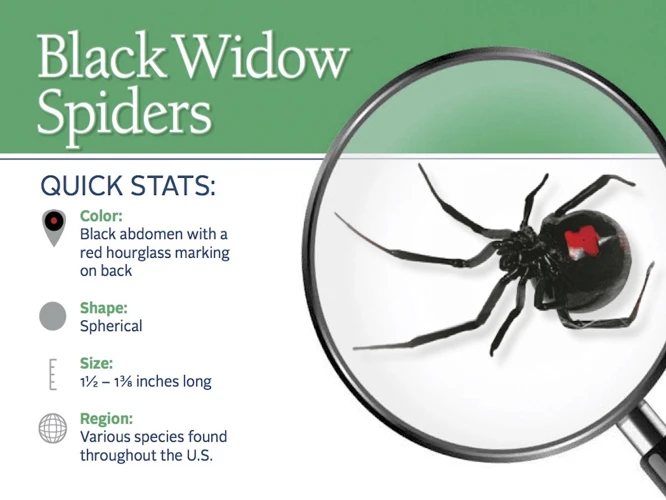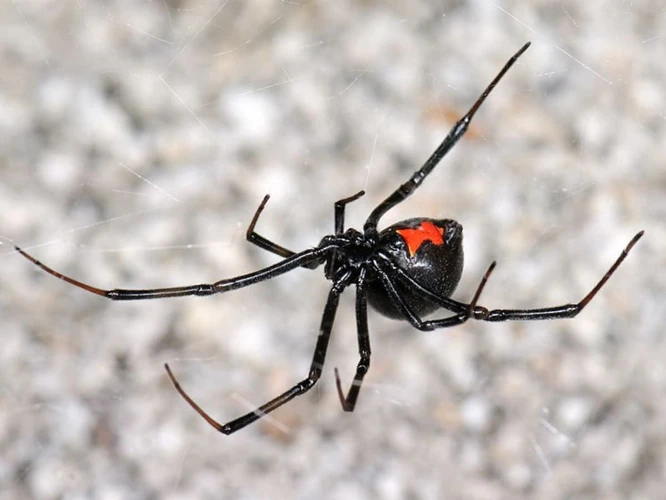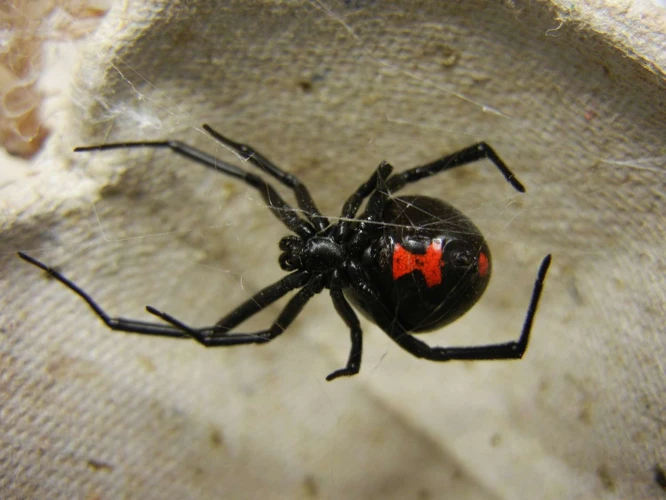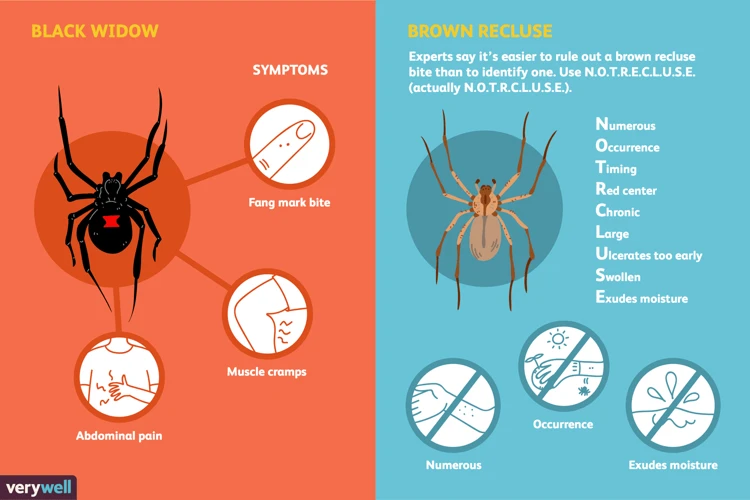Black widow spiders are venomous creatures that can be found in many parts of the world, including North America. If you happen to be bitten by one, it’s important to act quickly and seek the appropriate care. However, not all bites require medical attention and can be managed at home as long as you know what to do. In this guide, we will go through step-by-step on how to care for a black widow spider bite at home. From identifying the symptoms to prevention, we will provide you with the necessary information to keep you and your loved ones safe. So, let’s dive in and learn how to properly care for a black widow spider bite.
Identifying a Black Widow Spider Bite

If you think you may have been bitten by a black widow spider, it’s important to know the signs and symptoms to properly identify the bite. Black widow spider bites can be dangerous, so it’s essential to take the necessary steps for proper care and treatment. Recognizing the Symptoms is the first step to understanding whether or not you have been bitten by a black widow spider. If you are unsure about your symptoms or would like more information on black widow spider bites, you can check out our article on identifying and treating black widow spider bites.
Recognizing the Symptoms
| Symptom | Description |
| Pain and Swelling | Black widow spider bite may cause severe pain and swelling around the site of the bite. |
| Redness | The bite area may be red in appearance and may have a bull’s-eye pattern in severe cases. |
| Muscle Cramps | The affected person may experience muscle cramps, especially in the abdominal region, which can be very painful and intense. |
| Sweating | The person may experience profuse sweating starting from the bite site and may spread throughout the body. |
| Headache and Dizziness | Black widow spider bite may cause headache, dizziness, and even nausea or vomiting in some people. |
If you experience any of these symptoms after a suspected black widow spider bite, it is important to seek medical attention immediately. Ignoring the symptoms can lead to more severe health complications hence, it is best to seek professional help rather than trying to treat the bite at home. In the next section, we will go through the Step-by-Step Care that you can take before reaching a medical facility.
What to Look For
When it comes to identifying a black widow spider bite, it’s important to know what to look for, as early recognition can make all the difference in successful treatment. Here are some signs and symptoms that may indicate a bite from a black widow spider:
| Symptom | Description |
|---|---|
| Pain | The bite area may experience severe pain that can radiate to other parts of the body. |
| Muscle cramps | One of the classic symptoms associated with a black widow spider bite are painful muscle cramps, especially around the abdomen. |
| Sweating | The affected area may become sweaty and clammy as a result of the body’s reaction to the venom. |
| Nausea and vomiting | Many people who have been bitten by a black widow spider report feeling nauseous and may even vomit. |
| Increased heart rate | As a result of the venom from the spider, some people may experience tachycardia, which is a rapid heartbeat. |
| Headache | Some people may experience a headache or other neurological symptoms after being bitten by a black widow spider. |
If you are experiencing one or more of these symptoms, it’s important to take the necessary precautions and seek treatment as soon as possible. For additional information, check out our article on when to seek medical attention for a black widow spider bite.
Step-by-Step Care

Once you have identified a black widow spider bite, it’s important to take immediate action to minimize its potential effects. Proper care can help alleviate discomfort and reduce the risk of further complications. In this section, we’ll break down the step-by-step process for caring for a black widow spider bite at home. From cleaning the bite area to taking over-the-counter pain relief, we’ll cover everything you need to know. If you want to learn more about preventing black widow spider bites, check out our guide on preventing black widow bites.
Clean the Bite Area
It is important to start the treatment of a black widow spider bite by cleaning the bite area as soon as possible. Use warm water, mild soap, and a clean cloth to gently wash the bite site. Avoid using harsh chemicals or alcohol-based cleansers that can irritate the area further. Cleaning the area helps to remove any venom that may have been left on the skin.
After cleaning the bite area, use a sterile bandage to cover it. This will prevent bacteria from entering the wound and reduce the risk of infection. If the bite site begins to show any signs of pus, redness, or warmth, seek prompt medical attention.
Note: Do not attempt to suck out the venom with your mouth, cut the wound, or apply a tourniquet. These methods have been proven to be ineffective and can actually make the situation worse.
For more information on first aid for a black widow spider bite, visit /first-aid-black-widow-bite/.
Apply Ice
One of the first steps you should take when caring for a black widow spider bite at home is to apply ice. This will help to reduce any swelling and inflammation that may occur around the bite area. You can wrap a few ice cubes in a clean cloth and place it on the bite for 10-15 minutes at a time, with short breaks in between to prevent ice burn.
| Step | Instructions |
|---|---|
| Step 1 | Wrap a few ice cubes in a clean cloth |
| Step 2 | Place the ice on the bite |
| Step 3 | Leave it on for 10-15 minutes at a time |
| Step 4 | Take short breaks in between to prevent ice burn |
Although this can help to alleviate some of the symptoms, it is important to note that ice alone is not a sufficient treatment for a black widow spider bite. If you have concerns about the bite or experience any serious symptoms, seek medical attention immediately. For more information on medical treatment options for black widow spider bites, check out our article on How to Identify and Treat a Black Widow Spider Bite at Home.
Elevate the Area
One important step in caring for a black widow spider bite is to elevate the affected area. Elevating the bite can help to reduce the swelling by promoting blood flow away from the bite site. To properly elevate the area, follow these steps:
- Find a comfortable position: Lie down on a bed or couch and prop up the affected limb with pillows. The limb should be elevated above the level of the heart, so make sure to adjust the number of pillows accordingly.
- Stay put: Once you have found a comfortable position, stay in it. Moving around too much can cause the venom to spread more quickly through your body.
- Rest: Rest is an important part of the healing process. Try to avoid using the affected limb as much as possible and take it easy for a few days.
It’s important to note that elevating the area alone may not be enough to provide relief from a black widow spider bite. It’s important to also clean the bite area, apply ice, take over-the-counter pain relief, and stay hydrated. If you experience any of the red flags or severe symptoms mentioned earlier in the article, seek medical attention immediately.
Remember, while there are many myths surrounding black widow spider bites and their treatment, it’s important to follow the steps outlined by medical professionals. Avoid using home remedies, such as possibly harmful medications or compresses, and seek medical treatment if necessary. For more information on black widow spider bite treatment for different age groups, check out our article on treatment for kids vs. adults.
Take Over-the-Counter Pain Relief
After cleaning and icing the bite area and elevating it to reduce swelling, the next step in caring for a black widow spider bite at home is taking over-the-counter pain relief. Nonsteroidal anti-inflammatory drugs (NSAIDs), such as ibuprofen and aspirin, can help reduce pain and inflammation. It is recommended to follow the instructions on the label and not exceed the recommended dose.
Acetaminophen is also an option for pain relief, as it can help reduce pain and fever. However, it is important to note that acetaminophen does not have anti-inflammatory properties like NSAIDs do.
In some cases, an individual may have an allergic reaction to NSAIDs or acetaminophen. If this occurs, it is important to stop taking the medication and seek medical attention immediately. It’s also important to avoid taking medication that contains codeine, as it can increase the risk of a severe allergic reaction.
While over-the-counter pain relief can help manage the pain and discomfort associated with a black widow spider bite, it is important to remember that it does not provide a cure. If symptoms persist or worsen, it is important to seek medical attention. In some cases, a black widow spider bite can cause serious health issues that require medical treatment, such as antivenom.
It’s important to note that while some treatment myths exist surrounding black widow spider bites, it is best to follow the advice of medical professionals and avoid relying on untested remedies. Proper medical treatment from a healthcare provider can help prevent complications and ensure a swift recovery.
Stay Hydrated
Staying hydrated is an important step in caring for a black widow spider bite. Drinking plenty of fluids can help flush venom out of your system and prevent dehydration, which is especially important if you are experiencing nausea or vomiting. It’s important to note that alcohol and caffeinated beverages should be avoided as they can dehydrate you further.
Here are some fluids to consider:
| Fluids to Consider | Reasons Why |
|---|---|
| Water | Helps to flush venom out of your system and prevent dehydration |
| Coconut water | Contains electrolytes that can help prevent dehydration |
| Sports drinks | Can help to replenish electrolytes lost due to sweating or dehydration |
| Broth or soup | Can provide essential nutrients and help keep you hydrated |
It’s important to note that while staying hydrated is essential, it shouldn’t be the only step you take in caring for a black widow spider bite. If you experience severe symptoms or have any concerns, seek medical attention immediately. Remember, prevention is key. Take steps to avoid encounters with black widow spiders and consider avoiding traditional home remedies and medications that can be ineffective or potentially harmful. Taking preventive measures can help to keep you safe from black widow spider bites.
When to Seek Medical Attention

It can be difficult to determine when to seek medical attention after a black widow spider bite, especially if you’re unsure of the severity of the bite. However, it’s important to remember that ignoring potential warning signs and delaying treatment can cause the condition to worsen. If you’re experiencing any alarming symptoms or have concerns about the bite, it’s recommended to seek medical attention immediately. While some black widow spider bites can be treated at home, it’s crucial to know when it’s time to see a doctor. Let’s take a look at some red flags to watch for and the medical treatment options that are available.
Red Flags to Watch For
It is important to keep an eye out for any red flags after being bitten by a Black Widow Spider, as some symptoms can indicate a severe reaction that requires immediate medical attention. Here are some red flags to look out for:
| Red Flag | What it Means | What to Do |
|---|---|---|
| Difficulty Breathing | This can be a sign of a severe allergic or anaphylactic reaction. | Seek medical attention right away. Call 911 or go to the nearest emergency room. |
| Muscle Cramps or Spasms | Black Widow venom can cause severe muscle pain and spasms that can be widespread. | Take an over-the-counter pain reliever like ibuprofen or acetaminophen. Do not take muscle relaxants or sedatives. These can make symptoms worse. Seek medical attention if pain or muscle spasms persist. |
| Severe Abdominal Pain | The venom can cause intense abdominal pain, cramping and nausea. | Take an over-the-counter pain reliever like ibuprofen or acetaminophen. Do not take medications specifically for nausea or vomiting without consulting a doctor. Seek medical attention if pain or nausea persists. |
| Unusual Sweating | If sweating is excessive or if something smells “off,” this can indicate a severe reaction. | Seek medical attention immediately if the sweating is accompanied by any other symptoms or red flags listed here. |
It is important to note that these symptoms can be indicative of a severe reaction, and should not be taken lightly. If any of these red flags are present, it is crucial to seek immediate medical attention. In some cases, immediate treatment with an antivenom may be necessary to prevent serious complications. However, antivenom is typically reserved for the most severe cases, and is not recommended for less severe reactions. For more information on the use of antivenom for Black Widow Spider bites, see our article on antivenom for Black Widow Spider bites.
Medical Treatment Options
There are a variety of medical treatment options available for more severe cases of Black Widow spider bites.
Antivenom: Antivenom is considered the most effective treatment for severe Black Widow spider bites. It’s made from the venom of black widow spiders and is injected into the body to neutralize the spider venom.
Pain Relief: If the pain from the bite is severe and does not respond to over-the-counter pain medication, seek medical attention. Your doctor may prescribe a stronger pain reliever.
Antibiotics: If the bite has become infected, your doctor may prescribe antibiotics.
Wound Care: If the bite has created an open wound, your wound will need to be cleaned and bandaged properly to prevent infection and promote healing.
Table below summarizes the medical treatment options for Black Widow spider bites:
| Treatment | Description |
|---|---|
| Antivenom | An injected medication made from the venom of Black Widow spiders to neutralize the spider venom |
| Strong Pain Relief | If over-the-counter medications are not effective, stronger pain relievers may be prescribed by a doctor |
| Antibiotics | If the bite becomes infected, antibiotics may be prescribed to prevent further complications |
| Wound Care | If the bite becomes a wound, it will need to be properly cleaned and bandaged to prevent infection and assist in healing |
It’s important to note that in severe cases, medical attention should be sought immediately rather than attempting to treat the bite at home.
Pro-tip: It’s important to avoid certain pain medications, such as aspirin or ibuprofen, as they can increase the risk of bleeding and should not be taken for Black Widow spider bites. For more information about what pain medications to avoid, check out our article on “Which Medications to Avoid for Black Widow Spider Bites.” Additionally, applying a compression bandage to the bite area can help slow the spread of the venom. For more information on proper compression bandaging techniques, check out our article on “How to Properly Compress a Black Widow Spider Bite.”
Preventing Black Widow Spider Bites
As much as possible, it’s always better to prevent a black widow spider bite than to deal with its aftermath. While these eight-legged creatures can be quite fascinating, they also pose a potential danger to humans. Fortunately, there are steps you can take to reduce the risk of encountering these spiders and getting bitten in the first place. Take note of these practical tips to keep yourself and your loved ones safe from black widow spider bites.
Tips for Avoiding Encounters
To prevent a black widow spider bite, it’s best to avoid encounters with them altogether. Here are some tips to help you stay safe and spider-free:
- Keep your home clean: Black widow spiders like cluttered, dark areas with minimal traffic. By keeping your home clean and free of clutter, you’ll make it less appealing to these creepy crawlers. Vacuum regularly and eliminate any piles of debris or old boxes.
- Seal potential entry points: Check your home for any potential entry points where spiders could sneak in. This can include cracks in the foundation, gaps around doors and windows, and holes in screens. Use caulk or weather stripping to seal these areas off.
- Use spider repellents: There are many natural and chemical repellents on the market that can keep spiders at bay. Try spraying peppermint oil, vinegar, or a commercial spider repellent around the perimeter of your home.
- Stay alert outdoors: Black widow spiders can often be found in areas such as woodpiles, garages, and sheds. If you’re spending time outdoors in these areas, wear gloves and long sleeves to protect yourself.
- Be cautious when reaching into dark areas: Before reaching into dark areas such as closets, attics, and crawl spaces, use a flashlight to check for any spiders hiding in the shadows.
By following these tips, you can reduce your likelihood of encountering a black widow spider and lower your risk of being bitten. Remember, prevention is key when it comes to venomous spider bites, so take the necessary precautions to stay safe.
Spider Control in and Around Your Home
It is important to take measures to prevent black widow spiders from nesting in and around your home. Here are some tips for spider control:
| Tip | Description |
|---|---|
| Keep your home clean | Black Widow Spiders are attracted to clutter and debris, so it is important to keep your home tidy. Vacuum regularly, dust often, and avoid leaving piles of papers or clothes lying around. |
| Seal cracks and crevices | Black Widow Spiders can easily slip into small openings, so it is crucial to seal any cracks and crevices you find inside and outside your home. This also helps with energy efficiency. |
| Install screens | You can prevent spiders from getting indoors by installing screens on your doors and windows. This also has the added benefit of letting fresh air into your home. |
| Manage outdoor lighting | Black Widow Spiders are drawn to light, so it is important to be mindful of outdoor lighting. Consider using yellow bulbs instead of white bulbs, as they are less attractive to spiders. |
| Trim vegetation | Black Widow Spiders like to hide in plants and bushes, so it is important to keep vegetation trimmed and away from the sides of your home. This also has the added benefit of making your yard look neater. |
| Use spider repellent | If you are experiencing a lot of spider activity, consider using a spider repellent around the perimeter of your home. There are many natural and organic options available on the market. |
By implementing these measures, you can significantly reduce the likelihood of a black widow spider infestation in and around your home. Remember to stay vigilant and take action at the first sign of spider activity.
Conclusion
In conclusion, caring for a black widow spider bite at home is possible, but it’s important to be vigilant in monitoring symptoms and seeking medical attention if needed. Remember to clean the bite area, apply ice, elevate the area, take over-the-counter pain relief, and stay hydrated to manage symptoms. However, it’s crucial to seek medical attention if you experience any red flags, such as severe pain or difficulty breathing.
Prevention is key when it comes to black widow spider bites, so take steps to avoid encounters. Be cautious when hiking or working in outdoor spaces, and wear protective clothing when necessary. Additionally, spider control measures can be taken in and around your home to reduce the risk of bites.
Overall, while black widow spider bites can be serious, with awareness and proper care, you can manage symptoms and avoid complications. Stay safe and informed, and seek medical help if needed.
Frequently Asked Questions
How common are black widow spider bites?
Black widow spider bites are relatively uncommon, but they can be dangerous if not treated promptly.
What are the symptoms of a black widow spider bite?
Symptoms of a black widow spider bite include muscle pain, cramps, spasms, sweating, and nausea.
How do I know if a spider is a black widow?
Black widow spiders are usually black or dark brown with a red or orange hourglass shape on their abdomen.
Can black widow spider bites be fatal?
While black widow spider bites can be very painful and cause severe symptoms, they are rarely fatal.
How do I clean the bite area?
You can clean the bite area with soap and water, but avoid using hydrogen peroxide or rubbing alcohol.
Should I apply heat to a black widow spider bite?
No, ice is the recommended treatment for a black widow spider bite to help reduce swelling and pain.
Can I treat a black widow spider bite at home?
Yes, you can treat a black widow spider bite at home with proper care and monitoring of symptoms.
When should I seek medical attention for a black widow spider bite?
If you experience severe pain, muscle weakness, difficulty breathing, or other serious symptoms, seek medical attention immediately.
How can I prevent black widow spider bites?
Avoid handling or disturbing black widow spiders and take measures to control spider populations in and around your home.
Are there any natural remedies for black widow spider bites?
While there are many natural remedies suggested online, there is no scientific evidence to support their effectiveness. It’s important to seek medical attention for proper treatment.






